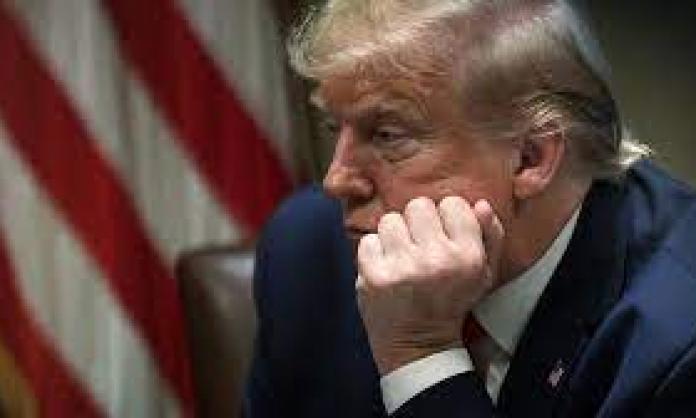The investigation into the storming of the US Congress in January last year has proven beyond doubt that Trump was seriously attempting a “soft” coup. Until recently, the media coverage have largely focused on the actions of a motley crew of conspiracists, used-car salesmen and fascists who led the events of 6 January. While undeniably despicable and deserving of serious contestation by the left, these forces are totally marginal to politics in the United States.
The hearings also revealed the extent to which Trump and his coterie were implicated in the events of the day. For weeks, Trump had been consciously passing on information about plans for the day, via Republican hitmen Roger Stone and Michael Flynn, both of whom have connections to far-right groups. On the day of the protest, Trump tried to get the secret service to remove the metal detecting equipment from near his stage, reportedly declaring: “I don’t fucking care that they have weapons, they’re not here to hurt me. Take the fucking [detectors] away”. He later tried to grab the steering wheel and force his chauffeur to take him to the Capitol building as the protest unfolded.
Trump worked to set up a situation in which his most fanatical supporters were armed and prepared for a march on the symbolic heart of US democracy. Yet these extraordinary events, however politically potent, were only a minor part of his plan to hold on to power.
The more insidious work was happening behind the scenes, where dozens of Republican bureaucrats and politicians were pressured to overturn the election results. The New York Times, for its own reasons, has reported extensively on the plan, spearheaded by former New York City Mayor Rudy Giuliani, to block Joe Biden’s certification as president-elect. It recently highlighted an email, subpoenaed by the investigative committee, in which one of Trump’s lawyers described the illegality of their plot: “We would just be sending in ‘fake’ electoral votes to Pence so that ‘someone’ in Congress can make an objection when they start counting votes, and start arguing that the ‘fake’ votes should be counted”.
The hope was that this administrative chaos, combined with grassroots pressure from his far-right base, would give Trump space to claim victory and stabilise the situation in his favour. This plan was a more dramatic repeat of George W. Bush’s successful manoeuvres against Al Gore in 2000, which involved a riotous attack on the vote counting in Florida by Republican thugs and, coincidentally, was also coordinated by Roger Stone.
Despite all this, the system held. Most Republican lawmakers drew the line at backing Trump’s dangerous attempt at a coup. Relatively few nationally significant figures signed up to his plan, some even describing the efforts as “treasonous”. Biden became president and Trump was banished to the dark corners of the internet.
Yet all is not well in the land of freedom and democracy. Far from being a one-hit wonder, Trump, his ideas and his supporters have become deeply entrenched in the Republican Party.
In the days after the riotous events in Washington, the vast majority of House Republicans voted to acquit Trump of any wrongdoing, 197 defending the former President against just ten who voted to impeach him. A subsequent vote in the Senate resulted in a similar result: 43 Republicans voting to acquit against seven for impeachment.
Despite the defence of this botched far-right putsch, the Republican Party continues its long march through the institutions. The most widely discussed is the conservative super-majority in the Supreme Court, but arguably as important is its dominance over state legislatures. Thus, a party that rarely wins a majority of the voting public manages to wield disproportionate influence in the halls of power.
Within this anti-democratic project, the hard right is squeezing out the so-called moderates. Of the ten House Republicans who voted to impeach Trump, only two have been reconfirmed as candidates for the midterm elections in November. The threat of being trashed by the party’s radicalised base means that otherwise establishment figures tend to comply with Trump’s edicts. Liz Cheney, a representative from Wyoming, has led the charge against Trump, but will likely lose her spot in a Republican primary later this month.
Hard-right Republicans led by experienced operative Steve Bannon are also attempting to stack the administrative machinery in charge of upcoming elections. The Republican candidate for secretary of state in Michigan is a previously unknown poll clerk, Kristina Karamo, who became famous after aggressively campaigning against “fraud” in the 2020 count. In Arizona, the Republicans have preselected election deniers to run for governor, secretary of state and attorney-general. Concerns about so-called electoral fraud are being used to further clamp down on voting rights, making it harder for workers and racial minorities to vote.
Half-hearted attempts by big business and the mainstream media to pull the party back to the political centre have long been abandoned. As long as the tax cuts and subsidies keep coming, the capitalists are happy to write off the extreme racism, misogyny and bigotry as the cost of doing business.
The Democratic Party has done embarrassingly little to respond to Republican challenges to basic democratic norms. Legislation to defend and extend voting rights has been shelved indefinitely. Discussions on a minimalist bill that seeks to clarify the transition from one president to the next are inching along, but most Republicans have shown no interest in backing any policy that implies that Trump did anything wrong.
More fundamentally, the Democrats have been incapable of rebuilding the legitimacy and credibility of the parliamentary process and the US state. They’ve proven themselves unable to call out the cynical populism of the Republicans, who claim to speak for “the people” but are interested only in expanding the profits of billionaires.
Biden had hoped both to stabilise US capitalism and to win support for the Democrats through his relatively ambitious Build Back Better program. But when conservative Democrats put up some hurdles, he settled for insignificant bills that hand billions over to corporations and do nothing to shield workers and the poor from soaring inflation. These failures have given Republicans a potent, though utterly cynical, talking point on the campaign trail.
It is too early to know what will happen in the midterms later this year. The election analysis site FiveThirtyEight currently gives the Democrats a 50-50 shot at retaining control in the Senate, but expects them to be trounced in the House. The situation remains hard to predict. Voters tend to rank the economy as their biggest concern, and the cost-of-living crisis could motivate voters to punish the pathetic inaction of the incumbents. Yet the Supreme Court’s decision to overturn abortion rights has given the Democrats an important mobilising tool. The surprise pro-choice victory in the Kansas referendum on abortion shows that this could have an important electoral impact.
The big question of US politics remains what to do with Donald Trump. A Department of Justice investigation into the events of 6 January has been gradually moving closer to directly approaching the former president. But there are questions as to whether any charges can stick, given it needs to be proven that he consciously intended to cause the violence seen at the Capitol building. A parallel investigation in Georgia seems more likely to prosecute him for breaching state laws, after Trump was caught on tape urging local officials to “find 11,780 votes” for him.
Yet there remains much hesitation around any such action. Trump looms large over US politics, and is likely to be a leading Republican candidate in the 2024 primaries. Sections of the Democratic establishment are clearly concerned that prosecuting Trump could cause a backlash among a radicalised Republican base. A political trial risks provoking civil unrest and even violence. Such a trial would place Trump once again in the centre of politics, and a successful defence would boost his chances of re-election.
That the establishment may hesitate before charging Trump, a clear and present danger to the limited democracy that the US still enjoys, is indicative of a profound political crisis.
What’s more, there’s a good chance that Trump or one of his more competent acolytes will be elected president in 2024. This will only add to the sense of disillusionment in US society. When Trump was elected the first time around, it sparked a series of sizeable progressive demonstrations, undermined US imperialism globally and generated a deep sense of national crisis. A return showing, after so blatant an attempt at a political coup, would be substantially more destabilising.











